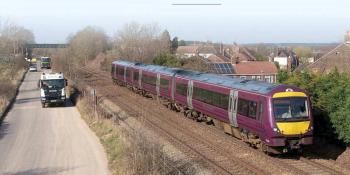News Front
GUT ENVISAGES ‘91s’ FOLLOWED BY ‘802s’

OPEN ACCESS operator Grand Union Trains has submitted an application to the Office of Rail and Road for rights to operate a new service on the Great Western main line.
The proposed service, outlined earlier this year (p17, August issue), would begin in May 2021 and would initially operate at two-hourly intervals between Cardiff Central and London Paddington, with calls at Newport, Severn Tunnel Junction and Bristol Parkway. Calls at Cardiff Parkway are proposed once this station opens, with investment promised to upgrade station facilities at Severn Tunnel Junction. The first train would leave Cardiff at 06.35 and Paddington at 08.35 and the last train from Cardiff at 18.35 and Paddington at 20.35, with a slightly reduced service on Sundays.
This would be operated by Class 91s hauling up to nine carriages and a driving van trailer, released by LNER from services on the East Coast main line, with the aim of starting crew and route training in autumn 2020. Grand Union says Eversholt Rail, which owns the sets, is currently working through route availability for their operation on the Great Western main line.
Subsequent to this, Grand Union plans to purchase new-build Class 802 bi-modes from Hitachi in up to nine-car formation, which would have a Grand Union-specified interior including improved seating and a fixed buffet/kitchen serving both classes of passengers. This would allow a doubling of frequency to hourly and extension of the service west from Cardiff fast to Swansea and Llanelli; plans to call at Bridgend, Port Talbot Parkway, Neath and Gowerton have been dropped. The first up train from Llanelli is planned to be at 05.10 and the last train at 18.10, with the last departure from Paddington an hour later than with the initial Cardiff service at 21.35.
COMPETITION
Grand Union says its proposal is designed to offer passengers to and from South Wales extra and new services and to give them a choice of operator for the first time since privatisation, addressing the disparity in frequency between Great Western Railway’s Bristol and South Wales routes once frequency to Bristol is doubled next year.
Highlighted benefits include high quality seating, more legroom, more luggage space and a fixed buffet with kitchen providing a range of catering. Flexible ticket options would include tickets available for purchase on board, and Grand Union proposes making a seat part of the price of a ticket, with 50% refunds for those travelling for longer than 30 minutes unable to obtain a seat.
Space for carrying light freight also features in Grand Union’s proposal. The company says it is working with partners at Intercity Railfreight on the logistics of this, with refrigerated space to be available for movement of urgent NHS biological materials. Initially freight would be carried in the DVTs of the Class 91/Mk 4 sets, while on the Class 802s the kitchen/buffet would be relocated towards the centre of the train to make space for freight.
Grand Union says it would base its operation in South Wales, where the trains would also be maintained, creating over 150 new and permanent full-time jobs. The current expectation is that five or six Class 91/Mk 4 sets would be used to cover three diagrams, deliberately having a large fleet to keep trains available for other potential uses.
As a consequence, trains would be maintained during the day rather than at night, while Grand Union says spare rolling stock could be used to provide additional capacity during events at the Principality Stadium and Celtic Manor Resort.
With the arrival of the Class 802s, maintenance would remain in South Wales, and Grand Union says discussions have taken place with potential maintenance providers.
Grand Union is looking to secure a 15-year track access contract running from May 2021, which it says reflects ‘the planned investment in the infrastructure and new build train fleet’.




